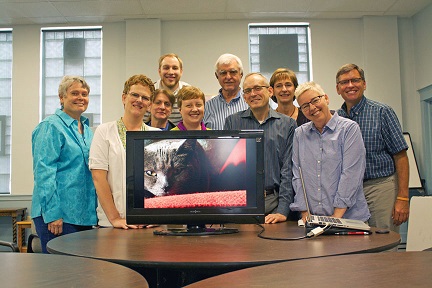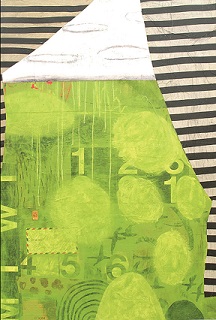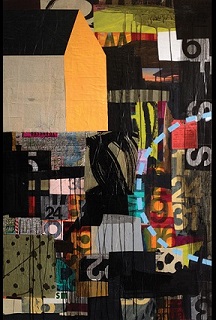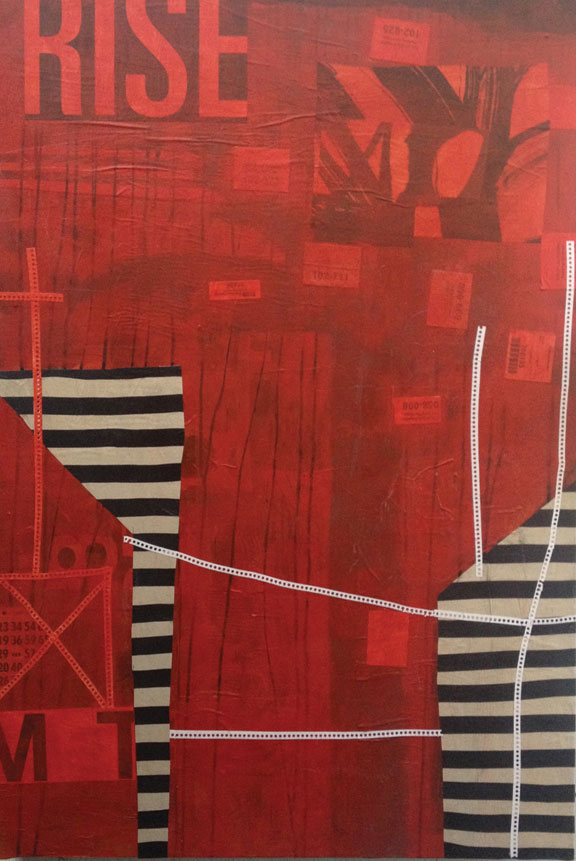 |
| During Spring 2013, Catholic Theological Union professor Eileen D. Crowley conducted a 6-week minicourse on "Photography as a Spiritual Practice," hosted by a Lutheran and a Presbyterian church. Participants created a series of photos to describe one or more of their callings in life. This photo shows the participants at Holy Trinity Lutheran Church (from left): Crowley, Pastor Michelle Sevig, Suzanne Stryczek, Josh Judd-Herzfeldt, Krisiti Herrald, Harvey Kahl, Pastor Craig Mueller, Carol Scickel, Julie Sevig, and Jon Skogen. The photo on screen is of Judd-Herzfeldt's cat, whose care is one of his callings. |
It’s hardly revolutionary to say that the average person in the pew sometimes finds it difficult to connect faith with the 9-to-5 world. And many clergy — having studied theology, history, the Bible, and even ancient languages — haven’t had the opportunity to reflect on whether the daily work of lay people can be a religious calling, just as full-time ministry is. A priest has a calling to ministry, and so does a nun. A missionary has a calling, as does a country parson. But what about a teacher? A real estate agent? A barista? An administrative assistant?
To be sure, almost everyone would agree that there are shared rules for living an ethical life — “don’t cheat, don’t lie, don’t harm others” — but scholars and researchers at several seminaries have been studying ways in which seminaries can help their students go deeper than simple moral axioms, thinking instead about a spiritual or religious vocation for life “in the world”— in the work place, but also at home, at school, and in the community.
Five seminaries and theological schools have participated in a Lilly Endowment-funded project, titled “Christians’ Callings in the World” (CCW), designed to spark generative thinking and creative initiatives. Each of the individual programs has had a common goal: to help theological school students — and, by extension, their future colleagues and parishioners — connect their faith and their everyday lives. The participating schools included Catholic Theological Union, Duke Divinity School, Fuller Theological Seminary, Luther Seminary, and Princeton Theological Seminary.
Common language about vocation
Vocation has been a powerful idea in Christian thought for centuries. “In the Bible, vocation has two primary meanings,” writes Douglas Schuurman in Vocation: Discerning Our Callings in Life. First is the “general calling” of each Christian to “become a member of the people of God and to take up the duties that pertain to that membership.” And then there is what Martin Luther called the “external calling” — the Puritans called it a “particular calling” — to specific areas of responsibility. Since at least the Middle Ages, most writing about vocation has focused on the particular calling of ordained ministry or consecrated (monastic) life, and thus has been rendered irrelevant to most people.
But in recent years, many Protestant and Catholic theologians have come to see that “general” and “particular” callings are inextricably linked. Writing in Callings: Twenty Centuries of Christian Wisdom on Vocation, Presbyterian theologian William Placher asserts that the “particular calling” is not necessarily an occupation, although it might be. It is more a preoccupation— something that calls a person forward. “Central to the many Christian interpretations of vocation is the idea that there is something — my vocation or calling — God has called me to do with my life,” he writes, “and my life has meaning and purpose at least in part because I am fulfilling my calling.”
It’s this understanding of “vocation” that David Lose was interested in exploring as director of the CCW project. A professor at Luther Seminary at the time, Lose oversaw the whole project while also participating in the specific initiatives at his own institution. He has since been named president of the Lutheran Theological Seminary at Philadelphia. “Our first task was to look at the definition of vocation from each theological heritage,” Lose says. “Did we share enough vocabulary in common to work cooperatively?”
Working groups at each institution generated energetic discussions, and each team developed different definitions. A few examples:
“Baptismal calling of the Christian to engage in secular activity intentionally as a disciple of Christ.”— Catholic Theological Union
“The Christian calling is to bear witness to Jesus Christ in everything, to everyone in every way.” — Princeton Theological Seminary
“God calls all Christians through the Gospel to participate in the creative and redemptive mission of God in the world.” — Luther Seminary
These definitions share basic commitments. Each begins with the work of God and then emphasizes that a person’s calling takes him or her outside of the church into the broader community.
Performative vs. formative ministry
At Duke, team members Andy Keck, Joy Moore, Cathy Watson, and Edgardo Colón-Emeric administered surveys to faculty and students at the divinity school and to a group of United Methodist lay pastors and ordained ministers training in El Salvador.
From surveys like this and other discussions, the CCW participants at multiple schools learned that many people reported profound experiences of God, but rarely had these experiences come during regular Sunday worship. In addition, most respondents struggled to find the language to describe and understand their experiences. Project leader Lose is not surprised. “Congregational life in the mainline context has been constructed to support religious participation rather than spiritual experience and growth,” he says. “While most people who attend church value their faith, they regularly experience a disconnect between it and the rest of their lives.”
Identity construction within the congregation has particularly diminished among young adults, says Lose. Instead, most people seem to find a sense of calling in their relationships. This is a problem when much of the classic Christian perspective on vocation has centered on structures and roles.
CCW participants also noted a further problem: When theological schools measure the competence of their students and graduates, they tend to define competence in terms of know-ledge and skills of the individual student — for example, the ability of the student to interpret the Bible or share their faith with clarity. What they don’t do is measure the pastor’s ability to be agents of formation in others — that is, to equip parishioners to interpret the Bible or share their faith.
Faculty focus
While respecting the role of the faculty in curriculum development, the team at each school sought effective strategies to integrate new understandings of calling into the fabric of their academic courses. For three years, each school’s team conducted experiments to discover how best to give students a new vision of Christian vocation and to prepare them to share this vision with fellow students and parishioners.
At Luther, the team was made up of tenured and tenure-track faculty, including two from each of the three academic divisions. They brainstormed and researched, questioning their own assumptions about teaching and scholarship.
Princeton’s team of six faculty members, a library administrator, and a local pastor reviewed and analyzed existing course designs. Then they developed a vision of how these new educational outcomes could be integrated into coursework, which led them to discussions with faculty in the disciplines of field education and continuing education.
Throughout the project, the teams from all five participating schools met during the summers to share findings, serve as sounding boards for one another, and engage in extended conversations about how to prepare graduates to equip their future parishioners with a robust vocational vision.
During the last two years of the grant, the schools drew the results of their work more deeply into the structures and practices of their own institutions. On some campuses, new programs were developed.
For example, at Princeton, project leaders advocated integrating the project’s goals into the overall M.Div. experience. So in 2011, student cohorts of 15 to 17 students were created, each of which met regularly with a local pastor and two faculty members who served as mentors. The groups gave students a forum for reflecting on how their course work was enabling them to become leaders who could equip others for the ministry.
Students immediately started describing the cohort as the most important component of their theological education. As the original cohort moved towards graduation, they developed plans to continue their work both in person and online. Meanwhile, new cohorts will be added until 2018.
Most of the professors who have taken part in the CCW project say that their professional activities have been significantly influenced. “After the first year, I found myself not just teaching methods of theological reflection, but adding, ‘Now how are you going to carry this into your ministry? How are you going to hand it on to those in your care?’” says Judith Logue, who took part in the initiative at Catholic Theological Union (CTU). “Today I have a much broader horizon of mission, of ministry, of God’s calling in the world, than I did five years ago.”
Logue and CTU coordinator Robert Wheeler developed a work-book to assist lay ministers in facilitating theological reflection groups that make connections between their faith and their daily lives. They also created a summer course and workshop on that topic for the National Association of Lay Ministers.
At the same school, Professor Eileen Crowley, who teaches liturgy and worship arts, began to explore new course content and classroom pedagogies on the theme of vocation. She developed a website, created a faith formation process based on small groups, and designed a minicourse in digital storytelling. During the grant period, Crowley also published two articles and presented at national conferences. “In every denominational setting and cultural context, I have delighted at seeing the excitement and ‘aha’ moments of participants as they reflect on what matters most in their lives,” she says.
At Duke, the project led to revisions in two core courses. Small course-development grants gave faculty members time to integrate a more robust understanding of the vocation of the laity into “Introduction to Church History” and “Introduction to Preaching,” both of which are required for M.Div. students.
At Luther, new programs were offered in lifelong learning, such as an annual event for pastors that focuses on developing Christian identity and practice in a secular culture. Something similar is in the works at Catholic Theological Union, but directed toward professionals and business leaders rather than clergy.
Curricular reforms
The “Christians’ Callings in the World” program has inspired changes in the curricula at several of the participating seminaries.
At Duke, two new degree programs were launched. The M.A. in Christian studies is a one-year, introductory program for residential students, and the M A. in Christian practice is a two-year, cohort-based program that combines residency with online synchronous teaching.
The CCW program led Luther Seminary to dramatic curricular revisions. Before the changes, course goals usually centered on the knowledge and intellectual development of the student, but now each course also includes a plan for how students can apply what they are learning to the communities they will serve. In this way, the program has moved the curriculum away from acquisition of knowledge to capacity for training others.
At Fuller, the changes made in the wake of the CCW program were just as sweeping. Mark Labberton, the project coordinator, was selected as Fuller’s new president in 2013, and he soon led the school to a new vision that puts the concept of Christian vocation right at the center. “We are purposefully expanding our support of students as they discern God’s calling through the entire process of living out that calling,” says Labberton.
Fuller’s new curriculum features a “Touchstone” course for entering students. In the class, students undertake psychological testing and guided reflection to discover their specific callings, and then they build course plans to prepare themselves for the vocation that they have begun to discern.
“The new M.Div. allows students to contextualize their curriculum around their vocational goals,” says Jeanelle Austin, who graduated in 2013. “It not only prepares students for pastoral or further doctoral work, but it also supplements the work of those called to the marketplace, local ministries, and Christian leadership in all walks of life.”
More about the calling of lay Christians
Librarians at several schools were involved in the “Christians’ Callings in the World” project, which resulted in the compilation of rich bibliographic materials.
Books
- Called: The Crisis and Promise of Following Jesus Today by Mark Labberton (InterVarsity, 2014, 176 pp., $16).
- Callings: Twenty Centuries of Christian Wisdom on Vocation by William C. Placher (Eeerdmans, 2005, 468 pp., $30). Leading Lives That Matter: What We Should Do and Who We Should Be ed. by Mark R. Schwen and Dorothy C. Bass (Eerdmans, 2006, 563 pp., $31). For a review of these two volumes together, see www.intrust.org/WisdomOnVocation.
- God at Work: The History and Promise of the Faith at Work Movement by David W. Miller (Oxford, 2006, 232 pp., $32).
- Preaching at the Crossroads: How the World — and Our Preaching — Is Changing by David J. Lose (Fortress, 2013, 124 pp., $19).
- The Gift of Work: Spiritual Disciplines for the Workplace by Bill Heatley (NavPress, 2008, 176 pp.).
Online
- “Call.” Curated reflections, art, and playlist from the Brehm Center at Fuller Theological Seminary.
- “Faith and Leadership.” An online magazine from Duke Divinity School that has published a series of articles on the“Christian Callings’ in the World” theme. Featuring a student, a graduate, a faculty member, and others. www.faithandleadership.com.
- “…in the Meantime.” David Lose’s blog, based on what was learned during the CCW project, was originally sponsored by the project. It features posts that regularly connect faith and life. www.davidlose.net.
- “Our Baptismal Call: To Serve with Joy and Courage.” Videotaped lecture by Professor Eileen D. Crowley of Catholic Theological Union. “Our Callings in the World.” A portfolio of Professor Crowley’s work, including writings, resources, photos, and digital stories about callings.
- “Theology of Work.” Research and writing on the Bible and vocation. www.theologyofwork.org.
- “Vocation: Learning To Count the Right Things.” Videotaped conversation with author and musician Tim Suttle. vimeo.com/40538537.
- “Vocation Resources for Christians’ Callings in the World.” Bibliography by Melody Layton McMahon, director of the Paul Bechtold Library at Catholic Theological Union, with entries categorized by occupation, denomination, and population type. christianscallings.weebly.com.
Reflections for board members
Board members at institutions considering curricular changes may want to answer several questions inspired by the “Christians’ Callings in the World” project.
Goals. Are we seeking major changes to our curriculum or more modest changes, like a new course or a new cohort structure? What is our definition of “success”?
Challenges. Have we considered how to handle inevitable bumps in the road? We should plan for competing priorities to emerge while we are considering these or any changes to our curriculum or formation program. What happens if the president resigns or other key leaders retire? How can we ensure that we will learn from unsuccessful experiments? What will be our approach if the focus needs to change?
A winding road. Progress was not always linear or logical for the CCW schools, and many realized that the ingrained structures of their institutions prevented them from making the kind of fundamental changes that a new approach to vocation would require. However, all the participants appreciated that a seminary is an excellent place to ask questions about calling, and theological educators are well equipped to guide people as they ask, “Is my life meaningful?”
 |
|
"She's in Deep Water," a mixed media collage by Anne Baumgartner.
|
Anne Baumgartner’s art is featured on www.brehmexperience.com, a website that explores the themes of the “Christians’ Callings in the World” project at Fuller Theological Seminary.
Before leaving for college, a beloved art teacher pulled me aside for an honest talk about my talent and direction. She persuaded me to change course and major in art. This made all the difference, laying the creative foundation for my life.
But in later years, life became more complex, with teaching, marriage, three children, and my husband’s call to pastoral ministry. I pushed my own art to the sidelines and focused on stabilizing the family. I didn’t quite understand that the art practice was integral to my calling and freedom. It took a good friend to confront me: Why were my art supplies kept upstairs in a closet? She helped me move everything downstairs that day, and suddenly I was free to live life from a messy project space.
 |
| "Plant," a mixed media collage by Anne Baumgartner. |
When my husband and I moved to Hollywood, it seemed like we let go of everything familiar. Everyone asked, “How is it going in L.A.? I wanted to give victorious answers and spin reports of success, but each day held a different story. There were tears, laughter, confusion, and surprises.
 |
| "Rise," a mixed media collage by Anne Baumgartner. |
I saved calendar pages and painted on those for the base of the piece above. They remind me of the daily rhythm beneath all of the change. I pasted maps and odd service tags. Layers of bright color contrast with dark spaces. The interesting, accidental shapes reference overlapping life events and unexpected beauty. We still cry sometimes, and the drips roll down.
As the title suggests, this is a story about hope and moving into the future. My art practice helps me work through the call to serve Christ in the world.
Anne Baumgartner works and teaches art in Los Angeles, and her work is online at www.abaumgartner.com. She and her husband, Dan, serve a church in Hollywood.